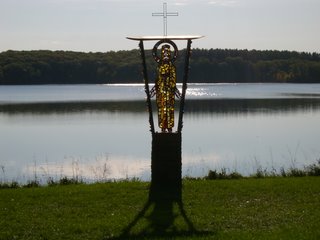Prayer Changes . . . ?

In his homily this morning, Fr. Earls told the story of a sign that was placed over the bridge near his home town which read, "Prayer Changes Things, Prayer Changes You." I was very pleased that the motto stretched beyond the first three words because I've always been somewhat bothered about folks who see prayer primarily as an instrument for attaining their own earthly wellbeing. This was exactly the point that Fr. Earls made from this morning's gospel lesson.
Jesus essentially remonstrates with the disciples because they ask wrongly--primarily for their own pleasures. Our human aspirations, the homilist maintained, are aimed at earthly rewards which stand at odds with the very essence of the good news of the gospel. This is supported, as well, by the epistle lesson in James where he claims that we not only ask wrongly but spend our prayers focused on our own passions. We look for lasting satisfaction in the things of this world; our prayers are directed at keeping our own happy earthly existence in focus.
Prayer, then, can oftentimes be seen as a kind of mantra we use (or implore the shaman to use) so that we can get what we want. But the nature of Christ's message is that we need to take our eyes off of ourselves and look around us. That is why he beckons a child forward. Now, even here, I think we can get the wrong idea. I've sometimes had students who say to me, "Doesn't Jesus say that we are to become like little children?"--assuming that this means that we are to have not only a simple but a naive faith that never asks questions. But, I have found that children are the most persistent at asking questions. "Why is the sky blue?" one may say.
So, prayer is not so much about us seeing God as the great "Santa Claus in the sky" who is simply waiting to shower us with good things (thus, the distortion of the so-called "health and wealth" gospel), but us coming into alignment with God's purposes for our lives. Granted, this can be both painful and mysterious. The problem of evil remains persistent. But, ultimately, prayer concerns whether I am willing to be changed--not insisting on God changing everything around me. So, in light of the emphasis on prayer changing us, one of the lines of the hymn we sang as the Eucharistic elements were being prepared today struck home:
"All that kills abundant living, let it from the earth be banned;
Pride of status, race or schooling, dogmas that obscure Your plan;
In our common quest for justice, may we hallow life's brief span."


<< Home